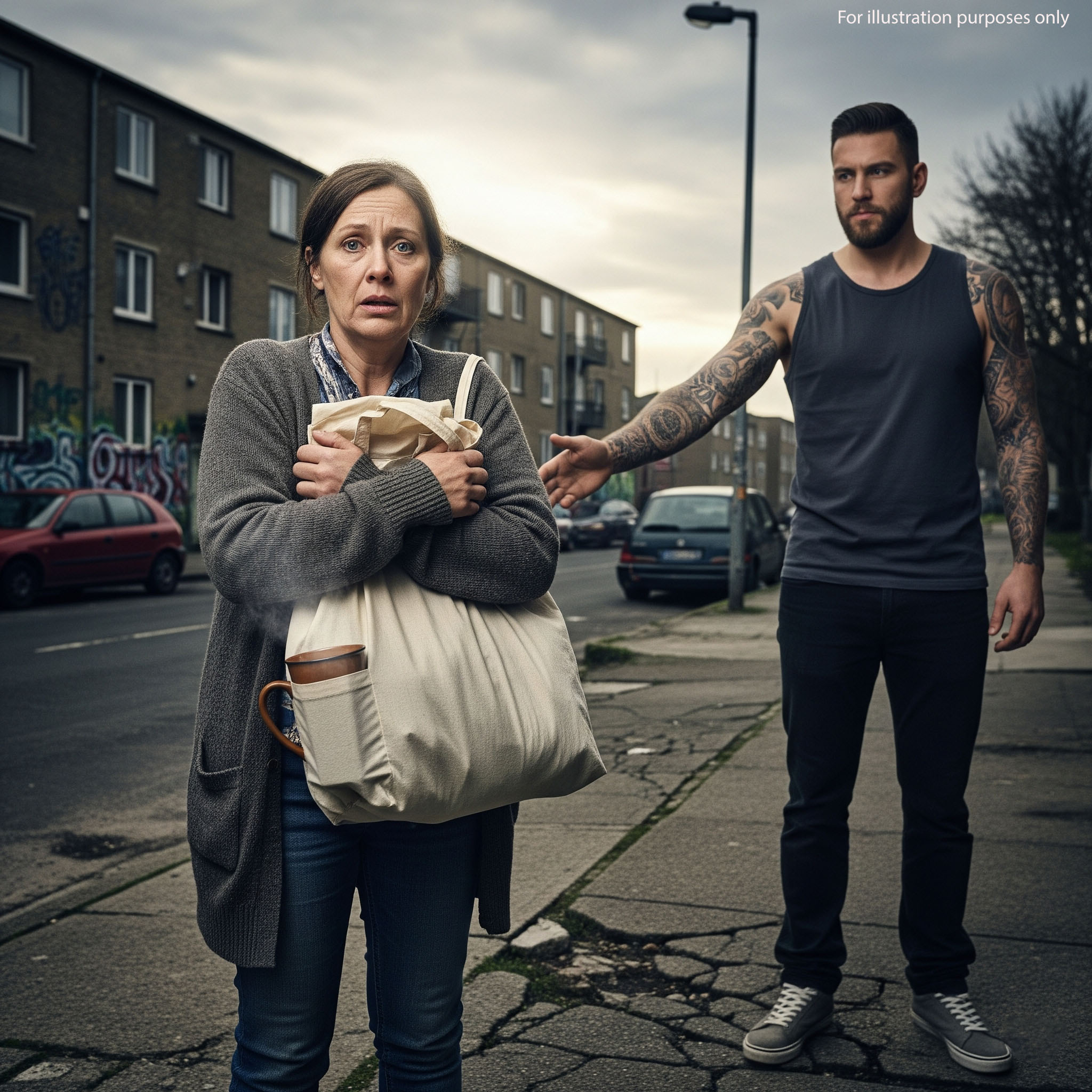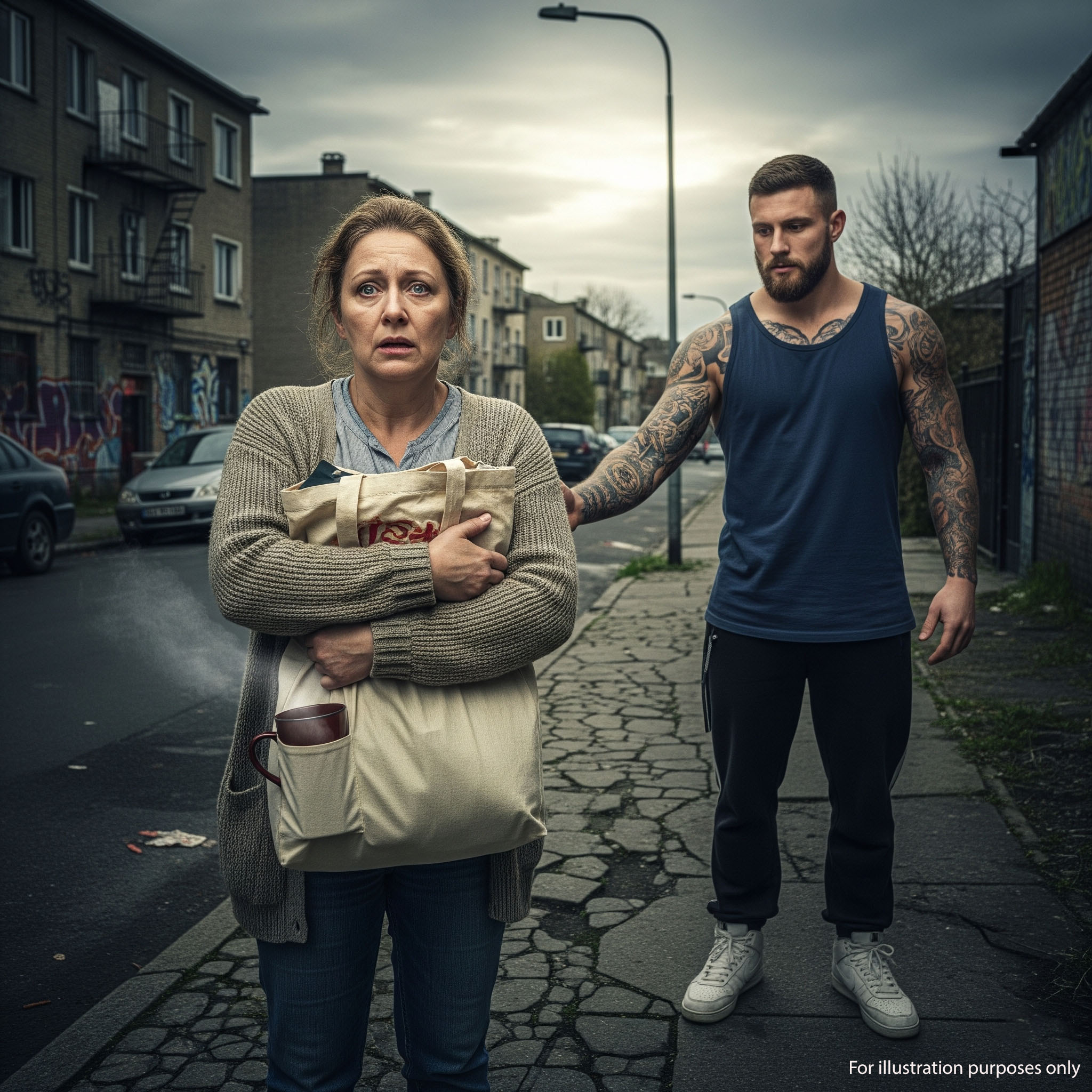I’d only lived there three weeks. Grief still hung on me like soaked clothes after a storm. My husband was gone, and so was the life we built together. Medical bills had taken everything but the essentials, and this apartment—cheap, cold, a little cracked around the edges—was all I could afford.
The street didn’t welcome. It eyed me like a stranger. The graffiti screamed. The sirens sang nightly.
And then came that day.
I had two bags of groceries in each hand and was fumbling for my keys when I noticed him.
Big. Towering. Built like someone who should be guarding a stadium, not crossing a cracked sidewalk in a beat-up tank top and shoes that looked like they could crush bricks. Tattoos spiraled down both arms.
I froze. My heart punched my ribs.
He was heading straight toward me.
I gripped my purse tighter. Fight or flight didn’t feel theoretical anymore. I braced.
But when he spoke, it stopped everything.
“You alright, ma’am?” His voice—deep, steady—was unexpectedly…gentle.
I swallowed. Then, against every instinct, I told the truth.
“I don’t feel safe here.”

He paused. Looked around like he knew exactly what I meant. Then he nodded once.
“Most people don’t. That’s why I walk around. So folks like you aren’t walking alone.”
Before I could respond, he took one of my bags like it weighed nothing and said, “Come on. Let’s get you home.”
No further explanation. No small talk. Just quiet presence.
At my porch, I asked, “Why do you do this?”
He gave a tired smile. “Because someone once walked with my mom. Changed her life. Changed mine.”
Then he left before I could thank him.
That night, I kept the blinds half open.
By morning, there was a brown paper bag on my step with a note:
“Fresh from Miss Anita’s. Start with the peach scone.”
Three pastries inside. Still warm.
No name. But I didn’t need one.
In the days that followed, I saw him again—and again. Helping an elderly man lift groceries. High-fiving teens with skateboards. Pulling two men apart outside the liquor store like it was nothing.
I asked the woman at the corner store who he was.
She smiled softly as she rang me up. “That’s Marcus. Lives two streets over with his sister. Solid guy. Been through fire, that one.”
“What kind of fire?” I asked carefully.
She lowered her voice. “Lost his dad early. Got in with some bad people as a teen. Nearly lost himself. But he turned it around. Studies at night, works at the rec center, and holds this whole block together.”
That night, I baked banana bread—the only recipe I never ruined. Still warm, I walked it over to the rec center.
He was outside, talking with a couple of teenagers. When he saw me, he stood.
“I figured it was you who left the pastries,” I said, holding out the foil.
He laughed. “Busted.”
“It’s not fancy. Just… thank you.”
He took the bread like it was something precious. “Thanks for not judging first.”
That was the beginning. We started talking more. I learned he was only twenty-eight, though he carried the world like someone twice that. His sister, Leila, was seventeen and already had college dreams. They looked out for each other.
One evening, Marcus knocked on my door with a tool kit.
“Saw your porch light flickering. Figured I’d fix it before it goes out.”
I made tea while he worked.
He started checking in every few days. And I always made sure something warm was waiting.
Then, one night, I woke to shouting.
A woman screaming across the street. Two shadows tangled in the glow of a streetlamp. One had a bottle.
I didn’t hesitate. I called Marcus.
He answered instantly.
“There’s a fight. A woman’s yelling,” I said, my voice shaking.
“Stay inside,” he said. “I’m coming.”
Minutes later, I saw him step into the chaos with calm, controlled steps. The man backed down. The woman sobbed into his shoulder.
The next morning, she was on his balcony, sipping coffee with Leila.
Marcus wasn’t just helping people.
He was rebuilding something.
Then—he vanished.
A day passed. Then another.
On the third day, Leila showed up at my door, her eyes red-rimmed.
“They jumped him,” she said. “After class. Took his phone and wallet. He fought back. They hurt him bad.”
I felt like the wind had been knocked from my lungs.
The next day, I brought banana bread and a small bouquet to his hospital room. His face was bruised, arm in a sling. But he smiled the second he saw me.
“Guess I’m not invincible,” he joked, voice hoarse.
“Marcus… let someone else carry the weight for a while.”
He looked at me for a long moment. “But who else will?”
That question haunted me.
So I answered it.
I started walking Miss Clara to the market. Organizing a food drive for the local family who lost work. Picking trash from the playground.
I wasn’t Marcus. But I could show up.
Soon, others did too.
Teenagers lowered their music when they saw me. Tre started walking dogs for elderly neighbors. The woman who never spoke across the street made soup when she heard Marcus was recovering.
We weren’t perfect.

But we were trying.
Marcus returned two months later. Slower. But still standing tall.
“You’ve changed this place,” he told me one day.
“No,” I smiled. “You did. I’m just keeping the wheels moving.”
That summer, we threw a block party. Music. Laughter. Even the landlord showed up—promised to fix the lights, scrub off the graffiti.
Later, Marcus and I sat on my porch—he had popsicles, I had iced tea.
“You know,” I said, “when I moved here, I was scared out of my mind.”
“I remember,” he said with a grin.
“But now… it feels like home.”
He looked down at his melting popsicle.
“My mom passed five years ago,” he said quietly. “She used to say: We’re not here just to survive. We’re here to leave things better than we found them.”
My throat tightened. “She’d be proud of you.”
He nodded slowly. “We’d make her proud.”
A while later…
Leila started college. Tre applied to be a firefighter. The corner store filled its window with sunflowers and fruit baskets.
One afternoon, the landlord’s office called.
“We’re reducing your rent by $100,” she said. “Fewer complaints. More renewals. Whatever you’re doing—keep doing it.”
I laughed, stunned. “You got it.”
As I stepped outside, Marcus jogged by.
“Hey!” I called. “You free next Saturday?”
He slowed. “What’s up?”
“I’m thinking of running a sunflower workshop for the kids. They want to learn to plant something.”
He smiled wide. “I’ll bring the shovels.”
Looking back…
I never imagined the place that scared me most would become the one that healed me.
But it did.
Maybe the answer isn’t always leaving.
Maybe it’s becoming the kind of person who makes a place worth staying in.
And sometimes, hope doesn’t come knocking.
It walks beside you, carrying your groceries.